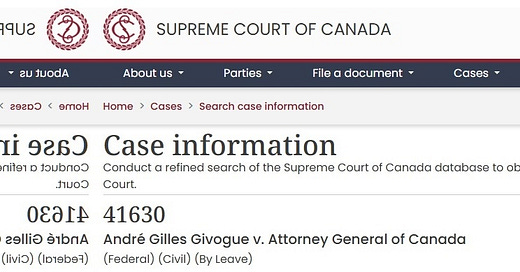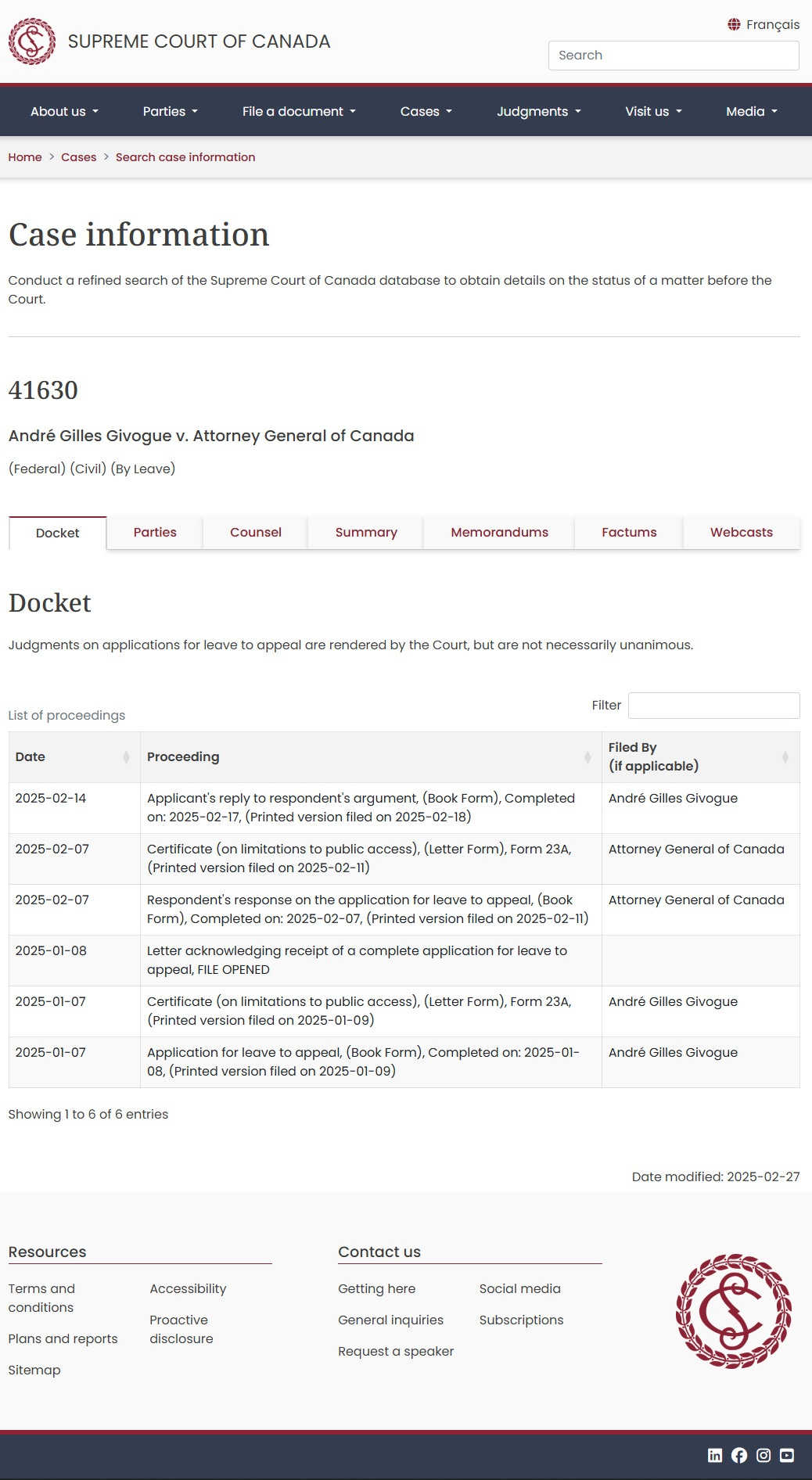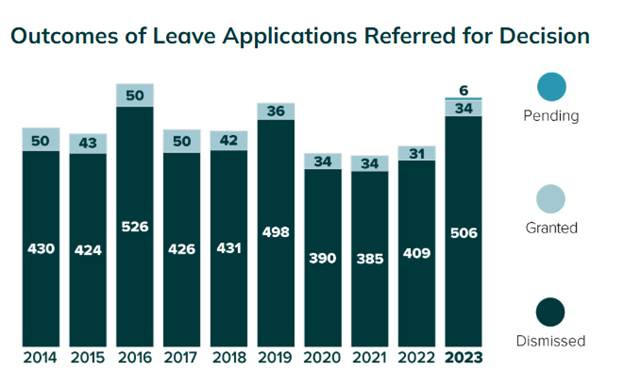Leave to Appeal Filed with the Supreme Court of Canada - A Critical Step Forward
A personal legal fight with national implications. Seeking clarity on genetic rights, privacy, and justice for all Canadians.
As some of you may have already heard, I’ve decided to take the next step in my legal journey. After a lot of reflection, discussions with my wife, consultation with lawyers, and careful consideration of both the costs and the potential impact, my legal team and I officially filed our application for leave to appeal to the Supreme Court of Canada.
This wasn’t a decision I took lightly (more on that later). Although I won on the issue of perceived disability at the Federal Court of Appeal, the Court did not evaluate my other argument about "genetic characteristics" on the correctness standard of review.
I believe that issue is far too important to leave unresolved. As it stands, it’s setting a troubling precedent for all Canadians. I truly believe this is a matter of national importance and not just about me or my personal experience, but rather about protecting the rights of all of us who value privacy, bodily autonomy, fairness, and freedom. Especially about the kind of Canadian future we are leaving to our children and future generations.
Law Firm Quick Introduction and Filing
This is where it gets a bit technical, but I’ll keep it simple.
My legal team, a boutique law firm called Supreme Advocacy that specializes in Supreme Court of Canada (SCC) files, and I submitted the application on January 7, 2025 and submitted our reply on February 14, 2025. Now we wait.
For those curious, my case is now listed publicly on the Supreme Court of Canada website as file number 41630:
🔗 André Gilles Givogue v. Attorney General of Canada (SCC Case Info)
Where We Are At - Roadmap
We’re at the stage where the Court Registrar prepares our application for leave, response and replies to be sent to the judges. Once the judges receive them, they will be reviewing the materials and decide whether to hear the case or not. It may take a couple of months for a decision, but this is the critical moment. If leave is granted, the full hearing would come next. You can read more about how the process works here.
About Leave Application Process
In Canada, you don’t automatically get to appeal to the Supreme Court, you have to ask for permission, which is called “leave to appeal.” The Court only accepts about 6% of applications each year, and only if the case raises a question of public or national importance.
https://www.scc-csc.ca/review-revue/2023/2023-Numbers-Statistiques-eng.html
I know it’s a big gamble for a 6% chance. That said, I believe my case stands a real chance because it raises a new issue of law: what exactly does “genetic characteristics” mean under the Canadian Human Rights Act?
Our Laws Protect Genetic Discrimination But What Does It Mean?
Our laws explicitly protect against genetic discrimination by recognizing genetic characteristics as a protected ground of discrimination. But the law doesn’t clearly define what qualifies as genetic characteristics. That gap in clarity has left the door open for confusion and conflicting interpretations. Lower courts, tribunals, and commissions have all struggled, or outright refused, to engage with the issue.
The Canadian Human Rights Commission dismissed my complaint as frivolous, denying it even the chance to be heard at the Tribunal. Other people who brought similar arguments at the Social Security Tribunal were told it was beyond their jurisdiction, and while the Federal Court of Appeal ruled in my favour on perceived disability, it didn’t engage with the genetic characteristics’ argument on the correctness standard.
It’s like a legal hot potato that no one wants to touch and keeps being passed around. This case would give the Supreme Court of Canada the opportunity to step in and clarify what it means once and for all. The law can’t protect Canadians if its key terms are left vague or avoided.
Canadians Were Forced to Disclose or Face Consequences
Millions of Canadians were forced to disclose personal health information, such as their mRNA vaccine status, undergo PCR testing and reveal their results or face consequences if they didn’t. This is especially concerning given that mRNA technology introduces genetic instructions into the body.
Many were told to comply or be excluded from work, services, sports teams, or even their own communities. It went deeper than policy; it created a profound divide in society, reaching into the heart of families. Even a friend, family member, or trusted colleague could suddenly become a social outcast, not because of who they were, but because of whether or not they carried those genetic instructions.
It allowed the government to create two classes of people, leaving one group to face stigma, exclusion, and discrimination. It became a new, modern-day form of segregation based on genetic discrimination, the very thing our laws were created to prevent.
In A Nutshell
Essentially, I’m arguing that being forced to disclose something genetic in nature, like mRNA vaccine status or PCR test results, should fall under the broader protections Parliament intended when it added “genetic characteristics” to the Canadian Human Rights Act (CHRA).
Parliament deliberately left that term broad, anticipating the need to adapt to future developments. Now, with emerging technologies like mRNA and new forms of genetic data collection, the SCC is being called on to clarify what those protections actually mean in today’s context.
We need clearer guardrails in law. Right now, there's a risk that human rights protections could be interpreted too narrowly, potentially leaving individuals exposed to discrimination based on genetic information obtained in ways the law never anticipated.
We are experiencing a slow erosion of our human rights under the guise of public health and doing nothing would make things even worse. The courts have ruled on parts of the Genetic Non-Discrimination Act (GNDA), but not on this. That’s the legal gap we’re trying to close and not just for justice in my case, but to bring clarity and fairness to all Canadians.
Especially now, in a time of rapid medical and technological change, we need to make sure our human rights protections aren’t lagging behind. I still believe there’s hope; hope that the law can catch up with modern reality and that our human rights protections will finally reflect the modern challenges we face, especially when it comes to genetic information and privacy.
From Self-Representation to a Legal Team
Up until now, I’ve been representing myself every step of the way. From the grievances, the Social Security Tribunal, the Small Claims Court, the Human Rights Commission, to the Federal Court, and then to the Federal Court of Appeal, I’ve handled motions, filings, and arguments and more.
That’s three years of intense legal research, writing, and learning as I went, while also being placed on leave, getting back to working full-time, supporting my young family, grieving the loss of our baby boy, Dominic, who was stillborn last fall, dealing with ongoing health challenges, loosing some close friendships for not going along with the status quo over my conviction that I’m doing the right thing instead of just “moving along” and forget anything ever happened, as well as other personal legal matters.
The Supreme Court, however, is a different beast entirely. It’s a whole new level of expertise and time commitment, as it operates under its own set of complex rules, procedures and expectations. With the stakes as high as they are, not just for me, but for what this case could mean for all Canadians, I didn’t want to risk losing the opportunity to have it properly heard on the merit because of technicalities or court formatting rules. Due to strict deadlines and time constraint, I simply didn’t have the mental capacity or legal expertise to do this part alone. Alas, I’ve reached the point where I need help.
Filing an application for leave to appeal at the Supreme Court comes with significant financial and emotional weight. The cost of hiring a law firm just to prepare the leave request is around $30,000, for a 6% chance that the Court agrees to hear the case. That’s it, no guarantee of a hearing and no assurance of remedy! It’s like buying a $30,000 lottery ticket with punishing odds, where the “prize” isn’t money, but simply the chance to be heard by proceeding to the next step.
If leave is denied, the money will be gone, and the case ends there. At the very least, this will have been the furthest this legal argument has ever gone, and that, in itself, really matters. It sets a marker. It tells future litigants, lawmakers, and Canadians that this issue wasn’t abandoned.
Yet, on the other hand, the thought of not trying weighed even heavier. After three years of legal battles, if I stopped now, all of that effort would feel wasted. More than that, I couldn’t live with the regret of leaving such an important question about human rights and genetic characteristics protections go unanswered. Not just for me, but for my children and every Canadian who may face similar discrimination in the future.
Take A Stand For What’s Right!
Furthermore, I needed to know that one day, if my daughters ever ask me what I did to protect their future, I could look them in the eyes, hold their hands, and sincerely tell them that against all odds and in the face of great resistance, I took a stand for what I believed was right, and did everything in my power to pursue justice, all the way to the highest court in our country.
However, if leave is granted, it will mean preparing for a full hearing. That next step would cost at least another $50,000. After weighing all of this, my wife and I made a difficult decision to refinance our home in order to retain one of Canada’s most experienced law firms in Supreme Court matters to represent me.
Even though I now have legal representation, I remain closely involved in reviewing drafts, shaping the arguments, and making sure the core message stays true. This is still my voice and my fight, I’ve just brought in experts to help bring it forward the right way.
They bring the legal precision and experience required to navigate the Supreme Court’s complex procedures. I bring a deep understanding of the facts, the context, and everything this case has been through. Together, we’ve crafted the strongest possible application for leave to appeal. It’s a true team effort now.
The stakes are higher, the rules are tougher, and it takes more than one person to carry it forward at this level. Although it wasn’t an easy decision financially, I knew that if I was going to take this fight to the top, I had to give it everything I had, no shortcuts, no regrets!
A Personal Note
This journey hasn’t been easy. At times, it has felt long, emotional, exhausting, and even overwhelming. I know I’m doing the right thing. I simply can’t “move on” and pretend none of it happened. I’ve stayed the course because I believe this case, and what it stands for, truly matters.
On top of that, I know I’m not alone. Many of you have carried your own burdens and faced your own struggles during this time, whether it’s the weight of what happened, the search for fairness and closure, or simply the need for recognition that what was done to so many wasn’t okay.
Although many of you have been navigating your own challenges, I’m incredibly grateful to those who’ve followed along, sent kind messages, sent financial support, or simply taken the time to read these updates. Your encouragement has helped more than you know. The notes of support, the shared stories, even a few words of solidarity, remind me why this legal fight matters, gives me a sense of support and reminds me that I’m not alone in this.
Thank You
So thank you, truly, for standing alongside me in whatever way you’ve been able. Together, we’re helping move things in the right direction. Each of us, in our own way, is standing up for something bigger than ourselves. Through persistence and principle, we will create new case law, shift public awareness, and slowly but surely awaken more people to what really happened.
How You Can Help
📢 How You Can Help
If you believe in what I’m doing and want to help, here are two simple but powerful things you can do:
🔁 Share this post. Get the word out to help spread awareness. The more people who understand the importance of genetic privacy, the better.
💸 Support my legal fund. Donations to my fundraiser helps offset the growing costs of this legal process so I can keep going. Every bit helps. Donate here
👉 www.GiveSendGo.com/AndreFightsBack
Standing Together
Again, thank you for standing with me. I’ll continue doing everything I can to fight back! Not out of anger, but out of principle and hope. 😊
– André
AndreFightsBack.com






thanks for your work, it seems only a few people really grok what we are up against, biologically.